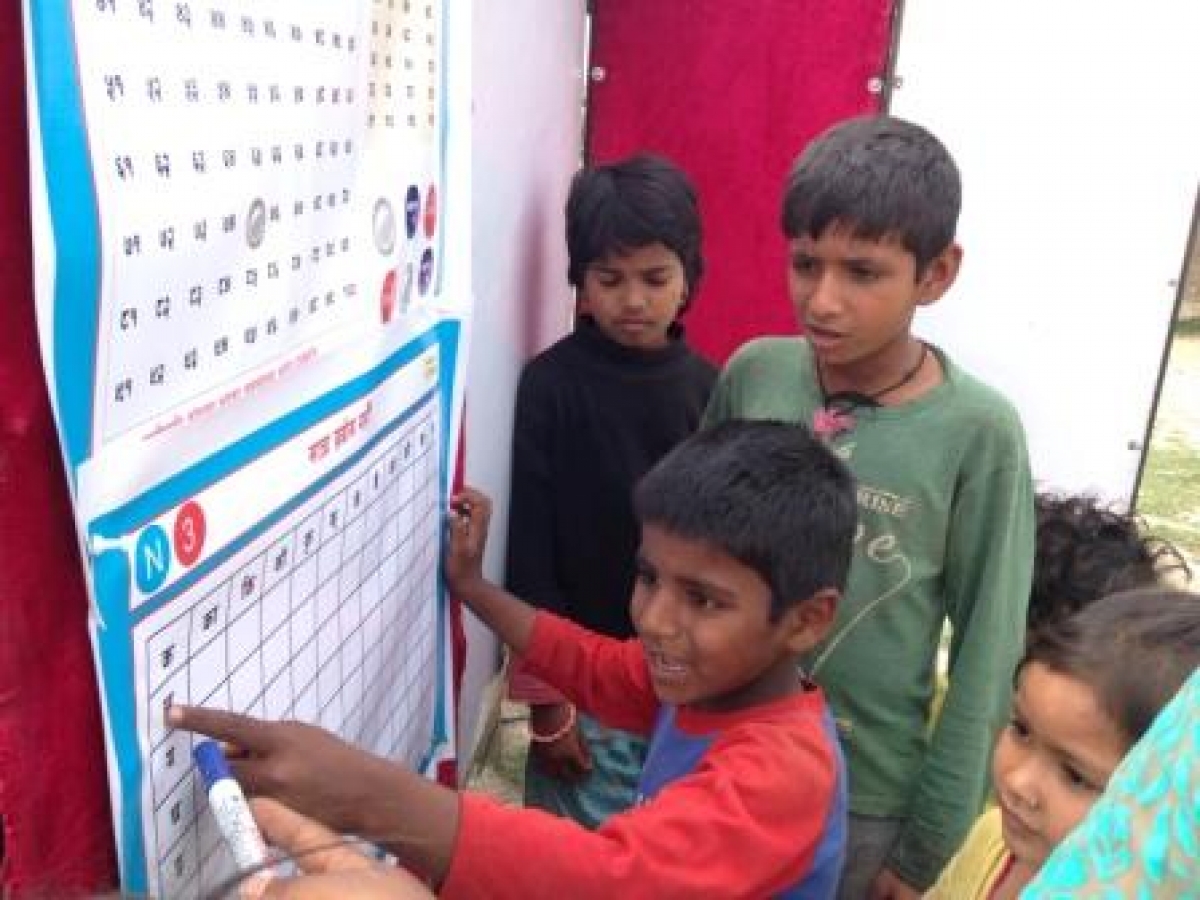
Kheldai Sikne Kendra (KSK)
&
Ghumti Sikai Thalo (GST)
(A Brief Introduction)
A. Kheldai Sikne Kendra (KSK):
The KSK is a flexible learning centre where out of school children and adolescents aged 10-18 are enrolled to provide them with a learning which meets their special needs at a time most convenient to them. Learning is based on child friendly activities. Each child is pretested to measure his/her learning level which sets the base for learning using the multi-grade multi level (MGML) methodology so that the trained facilitator can reach out to a number of children of varied age groups and learning levels and also to meet their aspirations. The curriculum and learning materials have been prepared with consultation from CDC/ NFEC experts, UOSP practitioners based on the expected learning achievement. The course contents include eleven core areas including basic numeracy and literacy (English and Nepali), Child Rights, Social Responsibility, Science and technology, creative therapy, health, life-skills, entrepreneurship, basic stimulation.
B. Ghumti Sikai Thalo (GST) :
The GST is a mobile learning cart with wheels and flexible boards that can be taken to different places where street children and adolescents are gathered like bus parks, cinema halls, vegetable markets and other such sites so that they can access a learning through different learning materials like games, charts which promote literacy, numeracy and life skills. The GST operate for 6 days weekly running for half hours time or more at selected sites. The aim of GST is to provide outreach services and minimize the high risks associated with these vulnerable and marginalized groups of children and adolescents. The other objective is to promote these children to the KSK or formal schools.
Beneficiaries: The target beneficiaries are urban out of school children and adolescents aged 10-18 years, street children, children selling newspapers, porters, domestic and industrial labourers, children working in the construction works, automobile workshops and other daily labour works, children in the transportation sector, children employed in hotels and hospitality jobs etc.
Implementing partners: Local Municipality (Nepalgunj, Bharatpur, Ratnanagar) and DEO (Kathmandu & Dhanusha); local NGO partner (Banke Unesco (Nepalgunj), Samudayak Sewa Kendra (Ratnanagar) & Diyalo Pariwar (Chitwan); Swayambhu CLC (Kathmandu) and Hanuman CLC (Janakpur). Funded by UNICEF & Technical support is provided from Samunnat Nepal.
Pilot Districts: Banke, Chitwan (2014-2015); Banke, Chitwan, Kathmandu & Janakpur (2016-2017)
Methodologies/ strategies: 1.Coordination with the Municipalities, Department of Education, Non Formal Education Center, Curriculum Development Centre (CDC), District Development Committees, District Education Offices, District Child Welfare Board and Federation of Chamber of Commerce and Industries (FNCCI) ;
- Capacity development of the Municipality & local partner, facilitators for managing KSK & GST centres, resource mobilization & networking with government line agencies for the sustainability.
- Collaboration and consultation with UNICEF regional offices for field level implementation and better linkages and inter sectoral collaboration.
Results:
- A total of 537 children have been beneficiaries of the KSK and GST centre of which 44% are girls (237).
- Around 29 % of the KSK enrolled children were mainstreamed in formal schools.
- More than half the children enrolled at the KSK centres are of 10-12 years age group (54%) followed by 13-15 years (35%) and fewer children are of 16-18 years age group (8%).
- Children are mostly Muslim (32%) followed by Madhesi (24%) and Janajati (21%) and Dalits are in a minority (12%).
- The data shows that a majority of children (75%) enrolled at the KSK have been drop outs of formal schools while a quarter of children (25%) have never been enrolled in schools.
CASE STUDY: Encounter with Mukesh Magar

One fine day, Sangita Khanal the facilitator at the KSK at Ratnanagar, Chitwan caught sight of a young boy unloading huge potato sacks from a truck. The boy at first ignored the interest shown by the facilitator asking his name and whereabouts. The boy smelled of alcohol and was clad in filthy clothes, uncombed hair and had dirty hands and feet. His name was Mukesh Magar. His eyes looked very sad and when asked about his family he pointed at a nearly 55 year old drunk man sleeping on another potato sack. Both father and son worked at the potato storage garage. Finally, she met with his employer at a later time, convinced him and brought Mukesh to visit KSK. After some inquiries, the facilitators met with his mother who had Tuberculosis. The facilitators helped his family with the medicines. Both the parents did not have any sense of responsibility towards their children and they decided to enrol Mukesh at the KSK.
Although Mukesh did not speak much in the first days, he began to slowly speak and open up. He now comes regularly to the KSK and stays from an hour to two hours on most days wearing clean clothes and combed hair. He has stopped working at the potato storage garage and works in a small hotel cleaning dishes and serving the guests with a smile. The facilitators are happy to see the smile in Mukesh and the progress he has made in his studies. After three months he knows how to write words in Nepali and English and constructs small sentences in Nepali. He however loves to draw.